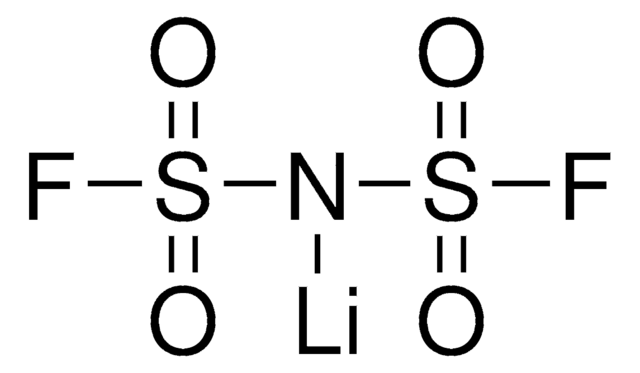229741
Lithium nitrate
99.99% trace metals basis
Synonym(s):
Lithium salt of nitric acid
About This Item
Recommended Products
Quality Level
Assay
99.99% trace metals basis
form
crystalline powder
mp
264 °C (lit.)
solubility
522 g/L at 20 °C
application(s)
battery manufacturing
functional group
nitrate
SMILES string
[Li+].[O-][N+]([O-])=O
InChI
1S/Li.NO3/c;2-1(3)4/q+1;-1
InChI key
IIPYXGDZVMZOAP-UHFFFAOYSA-N
Looking for similar products? Visit Product Comparison Guide
Related Categories
Application
Signal Word
Warning
Hazard Statements
Precautionary Statements
Hazard Classifications
Acute Tox. 4 Oral - Eye Irrit. 2 - Ox. Sol. 3
Storage Class Code
5.1B - Oxidizing hazardous materials
WGK
WGK 1
Flash Point(F)
Not applicable
Flash Point(C)
Not applicable
Personal Protective Equipment
Choose from one of the most recent versions:
Certificates of Analysis (COA)
Don't see the Right Version?
If you require a particular version, you can look up a specific certificate by the Lot or Batch number.
Already Own This Product?
Find documentation for the products that you have recently purchased in the Document Library.
Customers Also Viewed
Articles
Lithium-ion batteries' characteristics make them popular for electricity storage due to portability, rechargeability, and low cost.
Lithium-ion batteries' characteristics make them popular for electricity storage due to portability, rechargeability, and low cost.
Lithium-ion batteries' characteristics make them popular for electricity storage due to portability, rechargeability, and low cost.
Lithium-ion batteries' characteristics make them popular for electricity storage due to portability, rechargeability, and low cost.
Our team of scientists has experience in all areas of research including Life Science, Material Science, Chemical Synthesis, Chromatography, Analytical and many others.
Contact Technical Service









